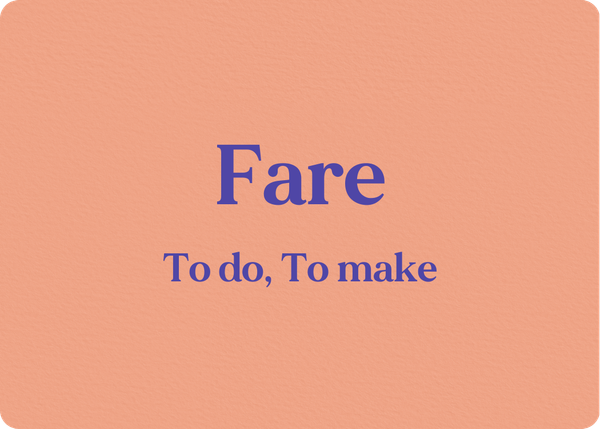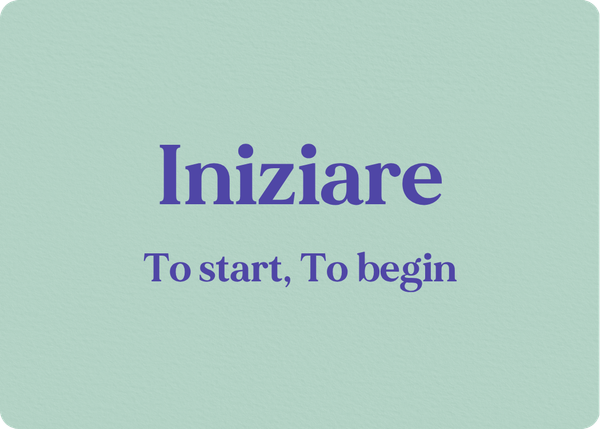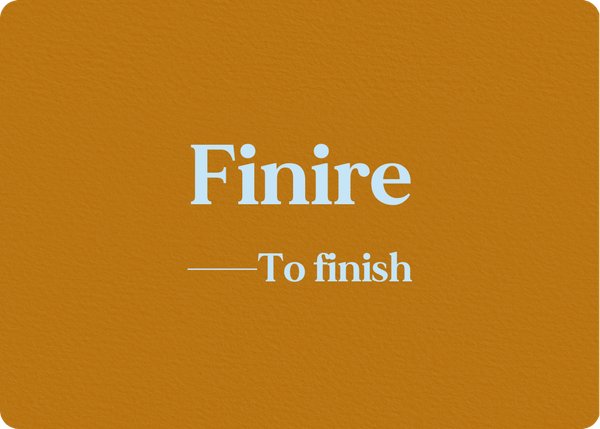What is Fare?
Fare is one of the most irregular and essential Italian verbs meaning "to do" or "to make". It belongs to the second conjugation (-ERE verbs) but is highly irregular in many tenses. This verb is useful for expressing countless daily actions and is one of the first verbs every Italian learner must master.
Key Features of Fare:
- Type: Irregular second conjugation verb (-ERE)
- Meaning: To do, to make
- Irregularities: Present tense (faccio, etc.), imperfect (facevo), simple past (feci, etc.), future (farò), present subjunctive (faccia), imperfect subjunctive (facessi), conditional (farei), imperative (fa'/fai), present participle (facente), past participle (fatto)
- Auxiliary verb: Uses "avere" (to have) for conjugation in compound tenses
- Past participle: Fatto
Indicativo – Indicative Mood
Presente (Present Tense)
| Person | Conjugation |
|---|---|
| io | faccio |
| tu | fai |
| lui/lei | fa |
| noi | facciamo |
| voi | fate |
| loro | fanno |
Example:
Faccio sempre colazione alle sette.
I always have breakfast at seven.
Passato Prossimo (Present Perfect)
| Person | Conjugation |
|---|---|
| io | ho fatto |
| tu | hai fatto |
| lui/lei | ha fatto |
| noi | abbiamo fatto |
| voi | avete fatto |
| loro | hanno fatto |
Example:
Gianna ha fatto una torta deliziosa.
Gianna made a delicious cake.
Imperfetto (Imperfect)
| Person | Conjugation |
|---|---|
| io | facevo |
| tu | facevi |
| lui/lei | faceva |
| noi | facevamo |
| voi | facevate |
| loro | facevano |
Example:
Da giovane, Mattia faceva volontariato in un rifugio per animali.
When he was young, Mattia used to volunteer at an animal shelter.
Trapassato Prossimo (Past Perfect)
| Person | Conjugation |
|---|---|
| io | avevo fatto |
| tu | avevi fatto |
| lui/lei | aveva fatto |
| noi | avevamo fatto |
| voi | avevate fatto |
| loro | avevano fatto |
Example:
Quando ho aperto il libro, Pietro aveva già fatto tutti gli esercizi.
When I opened the book, Pietro had already done all the exercises.
Passato Remoto (Simple Past)
| Person | Conjugation |
|---|---|
| io | feci |
| tu | facesti |
| lui/lei | fece |
| noi | facemmo |
| voi | faceste |
| loro | fecero |
Example:
Leonardo da Vinci fece molte scoperte importanti.
Leonardo da Vinci made many important discoveries.
Trapassato Remoto (Past Anterior)
| Person | Conjugation |
|---|---|
| io | ebbi fatto |
| tu | avesti fatto |
| lui/lei | ebbe fatto |
| noi | avemmo fatto |
| voi | aveste fatto |
| loro | ebbero fatto |
Example:
Dopo che ebbe fatto il discorso, tutti applaudirono.
After he had given the speech, everyone applauded.
Futuro Semplice (Simple Future)
| Person | Conjugation |
|---|---|
| io | farò |
| tu | farai |
| lui/lei | farà |
| noi | faremo |
| voi | farete |
| loro | faranno |
Example:
La prossima settimana faremo una gita in montagna.
Next week we will go on a trip to the mountains.
Futuro Anteriore (Future Perfect)
| Person | Conjugation |
|---|---|
| io | avrò fatto |
| tu | avrai fatto |
| lui/lei | avrà fatto |
| noi | avremo fatto |
| voi | avrete fatto |
| loro | avranno fatto |
Example:
Quando avrete fatto abbastanza pratica, riuscirete a suonare bene.
When you have practiced enough, you will be able to play well.
Congiuntivo – Subjunctive Mood
Presente (Present Subjunctive)
| Person | Conjugation |
|---|---|
| che io | faccia |
| che tu | faccia |
| che lui/lei | faccia |
| che noi | facciamo |
| che voi | facciate |
| che loro | facciano |
Example:
Vogliamo che tu faccia più attenzione quando guidi.
We want you to pay more attention when you drive.
Passato (Past Subjunctive)
| Person | Conjugation |
|---|---|
| che io | abbia fatto |
| che tu | abbia fatto |
| che lui/lei | abbia fatto |
| che noi | abbiamo fatto |
| che voi | abbiate fatto |
| che loro | abbiano fatto |
Example:
Penso che Matilde abbia fatto un ottimo lavoro.
I think that Matilde has done an excellent job.
Imperfetto (Imperfect Subjunctive)
| Person | Conjugation |
|---|---|
| che io | facessi |
| che tu | facessi |
| che lui/lei | facesse |
| che noi | facessimo |
| che voi | faceste |
| che loro | facessero |
Example:
Se tu facessi più sport, staresti meglio.
If you did more sports, you would feel better.
Trapassato (Past Perfect Subjunctive)
| Person | Conjugation |
|---|---|
| che io | avessi fatto |
| che tu | avessi fatto |
| che lui/lei | avesse fatto |
| che noi | avessimo fatto |
| che voi | aveste fatto |
| che loro | avessero fatto |
Example:
Se avessi fatto la valigia ieri, stamattina saresti partito in orario.
If you had packed your suitcase yesterday, you would have left on time this morning.
Condizionale – Conditional Mood
Presente (Present Conditional)
| Person | Conjugation |
|---|---|
| io | farei |
| tu | faresti |
| lui/lei | farebbe |
| noi | faremmo |
| voi | fareste |
| loro | farebbero |
Example:
Ilaria farebbe qualsiasi cosa per aiutarti.
Ilaria would do anything to help you.
Passato (Past Conditional)
| Person | Conjugation |
|---|---|
| io | avrei fatto |
| tu | avresti fatto |
| lui/lei | avrebbe fatto |
| noi | avremmo fatto |
| voi | avreste fatto |
| loro | avrebbero fatto |
Example:
Avremmo fatto volentieri una passeggiata, ma ha iniziato a piovere.
We would have gladly taken a walk, but it started to rain.
Imperativo (Imperative)
| Person | Conjugation |
|---|---|
| (tu) | fa'/fai |
| (lui/lei) | faccia |
| (noi) | facciamo |
| (voi) | fate |
| (loro) | facciano |
Example:
Fa' attenzione quando attraversi la strada!
Pay attention when you cross the street!
Indefinite Moods
Infinito (Infinitive)
- Presente (Present): fare (to do/to make)
- Passato (Past): avere fatto (to have done/made)
Examples:
Mi piace fare sport nel tempo libero.
I like to do sports in my free time.
Sono contento di aver(e) fatto quella scelta.
I'm happy to have made that choice.
Participio (Participle)
- Presente (Present): facente (doing/making) - a verbal form rarely used, mainly in bureaucratic language
- Passato (Past): fatto (done/made)
L’associazione facente parte del progetto ha ricevuto i fondi richiesti.
The association that is part of the project has received the requested funds.
Ho fatto una bella passeggiata nel parco.
I took a nice walk in the park.
Gerundio (Gerund)
- Presente (Present): facendo (doing/making)
- Passato (Past): avendo fatto (having done/made)
Facendo le cose con calma, si evitano molti errori.
By doing things calmly, many mistakes are avoided.
Avendo fatto molti sacrifici, ha raggiunto i suoi obiettivi.
Having made many sacrifices, he reached his goals.
The verb Fare at a glance: Key tenses you need
| Present | Present Perfect | Imperfect | Present Subjunctive | Imperfect Subjunctive | Present Conditional |
|---|---|---|---|---|---|
| io faccio | io ho fatto | io facevo | che io faccia | che io facessi | io farei |
| tu fai | tu hai fatto | tu facevi | che tu faccia | che tu facessi | tu faresti |
| lui/lei fa | lui/lei ha fatto | lui/lei faceva | che lui/lei faccia | che lui/lei facesse | lui/lei farebbe |
| noi facciamo | noi abbiamo fatto | noi facevamo | che noi facciamo | che noi facessimo | noi faremmo |
| voi fate | voi avete fatto | voi facevate | che voi facciate | che voi faceste | voi fareste |
| loro fanno | loro hanno fatto | loro facevano | che loro facciano | che loro facessero | loro farebbero |
Conclusion
Mastering the conjugation of "fare" is absolutely essential for speaking Italian, as it's one of the most frequently used and versatile verbs in the language. This highly irregular verb requires memorization of its unique forms throughout multiple tenses and is fundamental for countless expressions and idiomatic phrases.
Remember the key points:
- Uses "avere" as auxiliary verb for conjugation in compound tenses
- Highly irregular in many tenses and moods
- Past participle is "fatto"
- Used in countless idiomatic expressions
- Essential for describing actions and activities
Keep practicing with real sentences and contextual examples to master this fundamental Italian verb!





